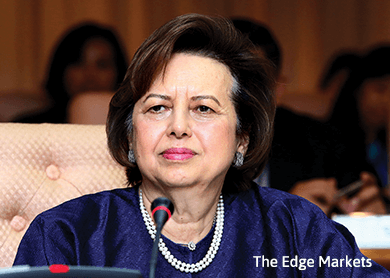
KUALA LUMPUR: The long-term growth prospects for China remain intact, Bank Negara Malaysia (BNM) governor Tan Sri Dr Zeti Akhtar Aziz said yesterday, despite near-term concerns about the renminbi (RMB) precipitated by short-term challenges faced by the Chinese government.
In an environment of continued weakness in the global trade, China’s short-term struggles include managing ongoing corrections in the real estate sector, leveraging on the financial system and the volatility in the stock market, she said.
“While these uncertainties may generate concerns over the RMB in the near term, it needs to be recognised that the long-term growth prospects for China remain intact, and that this will continue to strengthen the foundations that will support the transition of the RMB as an international reserve currency,” she said in her keynote address at the launch of the one-day HSBC forum, “RMB and China’s Global Future”.
She said China’s strengths are its high rate of savings, healthy external position, an inherent competitive mass manufacturing advantage and a large educated workforce, which will sustain its long-term potential economic growth.
The economic, financial and exchange rate reforms initiated by the Chinese government will be crucial in securing the long-term growth prospects for China, as the transformation of the Chinese economy’s structure is necessary to support its integration with the world economy and the international financial system, she noted.
“The recent one-off adjustment of the RMB reflects a conscious effort by China to align the RMB to a market-driven mechanism as a part of a crucial reform to allow the RMB to reflect financial market developments and economic fundamentals,” Zeti added.
She said the rise of the RMB as a global trading currency is often associated with expectations of rapid capital account liberalisation, but history has shown that many advanced economies continued to retain significant capital account restrictions until the early 1980s, later than the internationalisation process of their currencies that began in earlier decades.
“Such evidence suggests that the transition of the RMB as an international currency can commence with the gradual and sequential liberalisation of the capital account,” Zeti said.
“China’s position on a ‘managed convertibility’ approach instead of the traditional ‘fully or freely convertible’ can therefore be appreciated given the lessons from the global financial crisis and the risks associated with volatile capital flows even for such a large emerging economy like China,” she said.
Zeti noted that while the path for the RMB to be a fully international currency will remain gradual, the RMB has already achieved milestones.
“It is now the second most used currency globally for trade finance and the fifth most used currency for global payments. One quarter of China’s total trade is now invoiced in renminbi, and this is expected to double within the next five years.
“By some accounts, more than 60 central banks around the world already hold RMB in their official reserves,” she added.
According to Zeti, the increased usage of the RMB and the more developed regional financial markets for the RMB provide an opportunity to recycle savings within the region and thus support increasing intra-regional investment activities.
She also said the RMB can be a source of stability for the global monetary system as the increasing use and recognition of the RMB as an international reserve asset will strengthen the foundations of the current global monetary system that is currently reliant on a few major currencies. “With the increased economic and financial interconnectivity in the world today and the greater potential for international policy spillovers, a more multipolar global monetary system with more diverse sources of global liquidity would contribute towards a more stable international financial system,” she explained.
Zeti pledged that BNM will work towards further enhancing financial cooperation with the People’s Bank of China (PBoC) in the area of RMB Qualified Foreign Institutional Investor (RQFII) to provide an alternative avenue for Malaysian investors to invest in onshore Chinese financial markets.
An early pioneer of RMB initiatives, BNM has been at the forefront of building ties with the PBoC, including being the first Asean central bank to seal a currency swap agreement with the PBoC in February 2009.
This article first appeared in digitaledge Daily, on August 18, 2015.